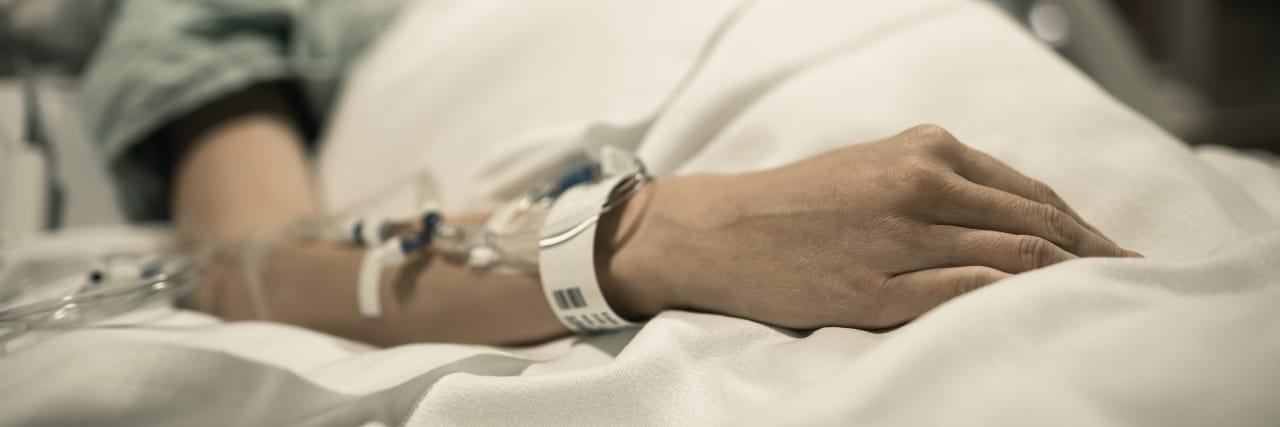Upon awareness, pain erupted throughout my body, and perspiration sprang up to bead my skin. I opened my eyes and looked around my hospital room through blurry double vision. An overlapping pair of identical nurses were replacing an empty IV bag with a full one.
“Where’s my mom?” I croaked through parched lips.
Two heads swiveled to look at me and smiled.
“She left about an hour ago,” two mouths said with one voice.
“But I was just talking to her.”
“You fell asleep, my dear. She’ll be back tomorrow morning.”
I nodded and closed my eyes, hoping to drift back into blessed unconsciousness.
It had been a few months since I emerged from the medically induced coma, and the injury to my brainstem from a rare illness was causing multiple “system malfunctions” that made simply existing feel virtually unbearable. My body thrummed with various types of pain, my skin felt like it was crawling with biting fire ants, and the sheet under my supine form was constantly moist and filled with wrinkles that felt like thin serrated blades pressing into my flesh. Wires and tubes snaked from my body to and from bags and machines that hummed and beeped. I was but a breathing bag of flesh and fluids, alive but irrelevant, just another unit in a warehouse of broken bodies in various stages of repair.
I wanted to die. The mental torment was as fierce as the physical agony, and every waking minute was permeated with deep depression and dread of the future. Sleep was the closest thing to death, a blessed empty void into which I could escape the prison of my flesh and the cyclone of my thoughts. This is why I had a meltdown when my mother told me that the family had asked my doctors to reduce my medications.
“Why?” I cried. “Why would you do that to me?”
The look of startled confusion on her face made me cry harder. My mother tried so hard to support me, leaving behind her home and work to live with my aunt so she could be by my side every day, all day. I knew in my heart that her only motivation was to ease my suffering. How could I explain why this decision would only increase the pain I was enduring?
“Honey, the high doses make you sleep so much, and you get so upset when you miss our visits,” she explained gently.
“But it’s my only escape,” I replied, trying to find a way to convey my desperation.
Mom was right. I did become terribly confused and sad when I woke up to discover that my mother or husband was no longer at my bedside, or that I had slept through a visit from loved ones who had traveled to visit me, or that I could never tell what time of day it was and my memories of recent events blurred together in a timeless fog. Being a recovering alcoholic, I knew that relying on drugs to cope with the unbearable state of my current existence was unhealthy and potentially dangerous, but it felt like the only tolerable option. Without the medicinal cocktail that bore me into peaceful unconsciousness, I would lie awake in pain and fear, my mind racing through an ugly internal dialogue that drove me deeper into depression and hopelessness.
“I can’t stand it, Mom! It hurts so much…I’m so scared! Sleeping is the only way to make it stop.”
Sudden understanding and deep empathy bloomed on my mother’s face, and she tenderly stroked my forehead with a cool hand.
“Oh, honey, I know! I’m so sorry.”
A wave of shame washed through me. What a burden I had become! Once so proud and independent, I had become an infant again, in body and mind, helpless and dependent on others for my most basic of needs. What would become of me? Would I spend the rest of my life languishing in a hospital bed in a drug-induced fog, periodically waking to pain and misery? Had I traded one type of substance for another to escape the reality of what my existence had become? If I couldn’t bury myself in the void of unconsciousness I would, quite literally, go insane!
But I didn’t. In fact, I grew stronger, in mind as well as body. Oh, it didn’t happen immediately, and the strengthening of my mind took far longer than the recovery of my body. But with the reduction of the medications came the ability to help myself. I was able to stay awake and aware enough to begin physiotherapy. I could spend time with loved ones who came to be with me, which greatly alleviated the boredom and loneliness of hospitalization. And I was able to begin advocating for myself and have a voice in directing my care. In time, I learned to tolerate and cope with physical pain more effectively, and as I slowly recovered, I required less and less medication.
I look back on those days with the wisdom and hindsight of one who has journeyed through intense trauma and returned, scarred and broken, but stronger from the forging, and with a new zest for life. Free of the intense pain and desperation that clouded my thoughts and enflamed my emotions, I am able to view the woman I was with empathy and gentleness. I recognize that there is no shame in wanting to escape suffering by whatever means necessary, and that logic and healthy decision-making can elude us in that quest.
I am grateful for the medications that helped ease my suffering at that time, and equally as grateful that I no longer need them. Mostly, I am grateful for the personal growth I have experienced as a result, and all the people who supported me along the way.
Getty image by Kieferpix

